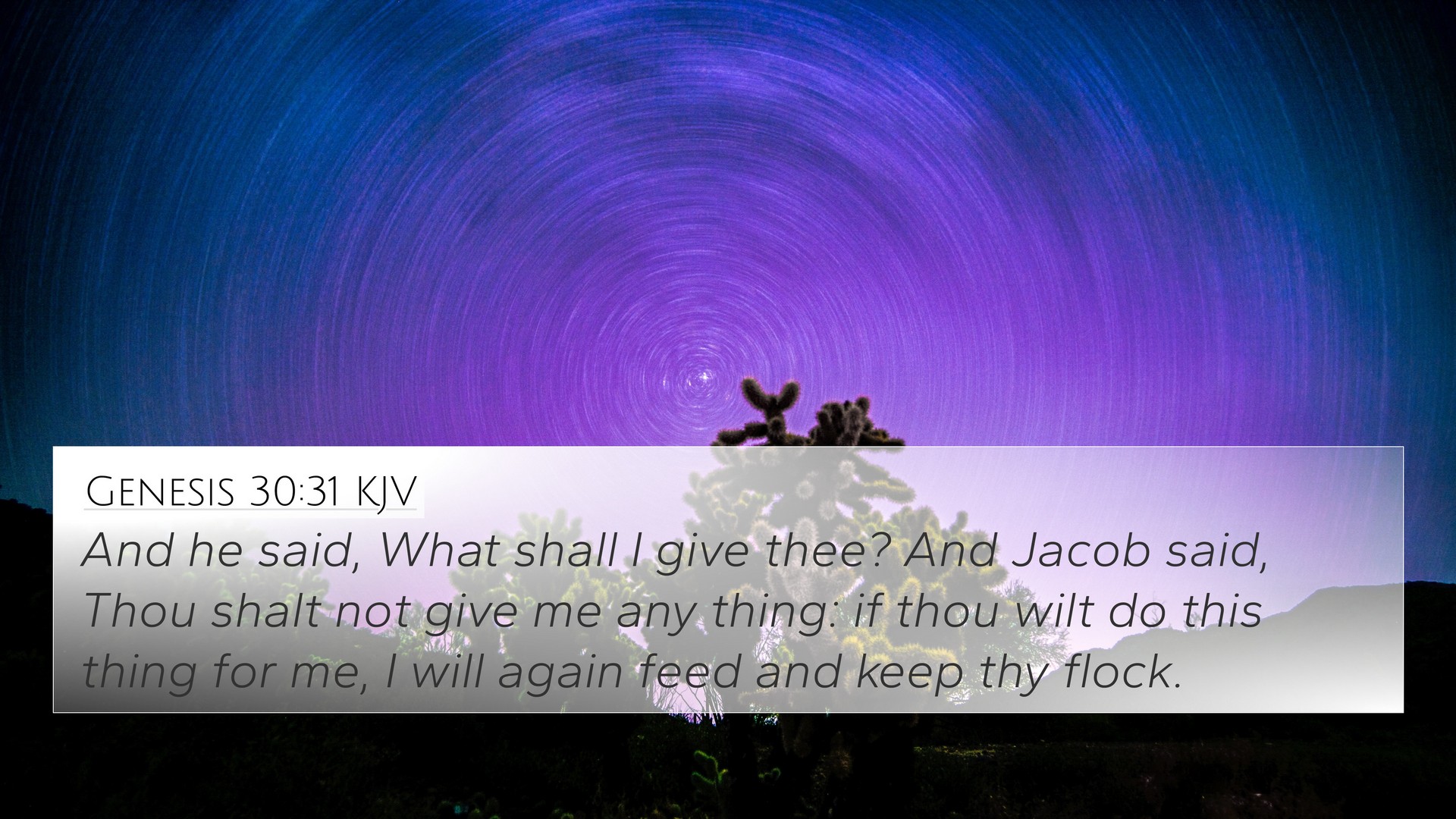Meaning of Genesis 30:31
Genesis 30:31 states: "And he said, What shall I give thee? And Jacob said, Thou shalt not give me any thing: if thou wilt do this thing for me, I will again feed and keep thy flock."
This verse captures a pivotal moment between Jacob and Laban, showcasing the exchange of agricultural interests and the strategic dealings in their relationship. Below, we summarize insights from notable public domain commentaries:
Matthew Henry's Commentary
Matthew Henry highlights the negotiation dynamics between Jacob and Laban, emphasizing Jacob's request as an appeal for fairness in their dealings. Jacob asserts that his labor has transformed Laban's possessions, and he's willing to continue working without monetary compensation. This reflects Jacob's trust in God's provision, ultimately seeking to gain livestock based on the natural variations of future births.
Albert Barnes' Notes
Albert Barnes provides an insight into Jacob's shrewdness in management and negotiation. He underscores Jacob's intention to remain in Laban's good graces, while also setting the groundwork for a favorable outcome in his time of labor. Jacob's masterful redirection of this offer signifies a deeper theological principle: our labor for others can yield divine favor and bounty.
Adam Clarke's Commentary
Adam Clarke examines the social and economic implications of this verse, indicating that Jacob is asserting control over his labor and future. His response is a strategic maneuver to ensure he can continue to grow his own wealth despite Laban's initial reluctance. Clarke also points to the significance of this moment in the larger narrative of Jacob's journey and God's unfolding plan in his life.
Cross-References
This verse connects with several others in the Bible that explore themes of labor, negotiation, and divine providence:
- Genesis 31:6-7: Jacob reflects on how he served Laban and how Laban altered his wages.
- Genesis 30:29-30: Jacob highlights how his labor has contributed to Laban's wealth.
- Proverbs 14:23: Emphasizes the value of hard work and its rewards.
- Colossians 3:23: Encourages doing work heartily as for the Lord.
- Matthew 10:10: The laborer is worthy of his hire, pointing to justice in compensation.
- 1 Timothy 5:18: References the importance of fair compensation for labor, linking to the concept of earning one's keep.
- James 5:4: Warnings against defrauding laborers emphasize the integrity of earning.
Thematic Connections
The themes explored in Genesis 30:31 resonate throughout Scripture, showcasing the interplay of human effort and divine provision. Transformation of character, strategic negotiation, and reliance on God's promises are echoed in many Bible verses, forming an inter-Biblical dialogue that enriches our understanding.
For example, exploring connections between the Old and New Testaments, Jacob's faith reflects in the New Testament through the teachings of Jesus about trust and providence. Jacob's willingness to adjust his expectations mirrors the New Testament principles of submission to God's will.
Tools for Bible Cross-Referencing
To understand and explore the meanings embedded in verses like Genesis 30:31, biblical scholars often employ various tools for cross-referencing. Some of these include:
- Strong’s Concordance
- Bible Cross-Reference Guides
- Bible Commentaries
- Bible Study Apps





